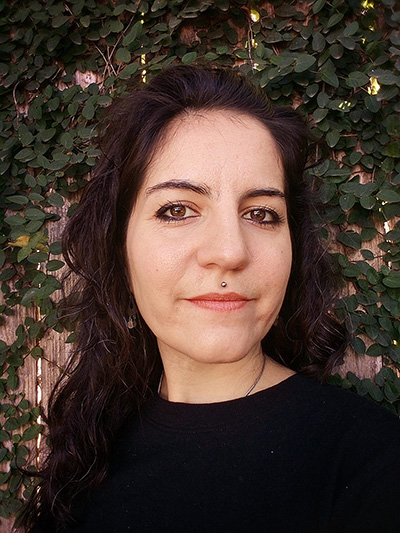Fiorenza Picozza| Comparative Cultural Studies Department | UH CLASS

Visiting Scholar (2022-2023),
Anthropology
Email: fpicozza@central.uh.edu
Office: Old Science Suite 230
Education
Ph.D., Geography, King’s College London
M.A.. Migration and Diaspora Studies. SOAS/University of London
B.A., Philosophy, University of Rome La Sapienza
Biography
Fiorenza Picozza is an ethnographer, educator and scholar of borders, migration and asylum. Her research stems from her previous involvement in refugee solidarity, particularly as social educator and language tutor, and it reflects her interdisciplinary background in anthropology, geography and philosophy. Her academic writing languages are English and Spanish, but she is a native speaker of Italian and an intermediate speaker of Persian – all these being language skills that have supported her fieldwork in highly multilingual settings. She has conducted extensive ethnography among refugees and migrants from diverse backgrounds, such as Afghanistan, Syria, Kurdistan, Somalia, Niger, Morocco and Palestine, as well as activists, volunteers, social workers and lawyers from both European and non-European backgrounds in Hamburg, Rome and London.
Her book, The Coloniality of Asylum, Mobility, Autonomy and Solidarity in the Wake of Europe’s “Refugee Crisis” (Rowman & Littlefield, 2021) offers a critique of asylum in Europe from the standpoint of refugees’ autonomous movements and spaces of solidarity. It shows how asylum is a regime of postcolonial subordination premised on the partitioning, objectification, Othering, and racialization of those labelled as “refugees”, and it links questions of the state to civil society, examining how practices of solidarity and sanctuary can unwittingly partake of the same coloniality they attempt to contest. Through a polyvocal account, the book sheds light on the mutual production of asylum and Europe and looks at the processes of racialization that shape “Europeanness” as a humanitarian, postmodern and postnational identity incompatible with “refugeeness” and rooted in postcolonial whiteness.
Further streams of her research, published in journal articles and book chapters, focus on legal subordination through policies of refugee allocation and deportation; the production of fragmented geographies and temporalities of transit; and processes of subjectivation and “refugification”. Currently she is working on an article on the interconnections of racial capitalism, war and asylum, particularly relating to the reabsorption of refugees within the asylum industry as laborers, instead of beneficiaries.
Beyond her ethnographic and qualitative research, she is also elaborating theoretical work on the contested relationship between marronage and slavery abolitionism, and the relevance of this history for contemporary debates about sanctuary, border abolitionism and refugee support across the Atlantic. Her most recent journal article, titled “Flight, marronage and sanctuary: critical genealogies for de-eurocentring the history of refuge in the Black Atlantic”, was published on Scripta Nova (in Spanish), and traces an alternative genealogy of sanctuary rooted in the historical experience of maroonage, as both labor insubordination and spatial flight.
Before joining the Department of Comparative Cultural Studies at UH, she was a postdoctoral fellow at UNAM’s Institute of Geography in Mexico City (2020-2022). She holds a PhD in Geography from King’s College London (2019), an MA in Migration and Diaspora Studies from SOAS/University of London (2014), and a Bachelor’s degree in Philosophy from the University of Rome La Sapienza (2009).
Selected Publications:
Books
(2021). The Coloniality of Asylum: Mobility, Autonomy and Solidarity in the Wake of Europe’s ‘Refugee Crisis’. Rowman & Littlefield.
Journal Articles
(2022) Huida, cimarronaje y santuario: genealogías críticas para deseurocentrar la historia del refugio en el “Atlántico Negro”. Scripta Nova. Revista Electrónica de Geografía y Ciencias Sociales 26(2): 101-124.
(2017). Dublin on the Move: Transit and Mobility across Europe’s Geographies of Asylum. movements: Journal for Critical Migration and Border Studies. 3 (1): 71-88.
Book Chapters
(2023) Racial capitalism, War and Asylum Seeking: Unearthing the Troubled Relationship between Refugee Support, Antiracism and International Solidarity. In Keskinen, S. P.; Aminkeng Atabong A. and Seikkula, M. Disobedient Knowledge: Activism and Everyday Struggles in Europe. Manchester University Press. (Forthcoming).
(2023) Coerción, libertad y legalidad: conceptos para entender la producción de la “raza” en los regímenes de frontera y asilo contemporáneos. In Miranda, B. (Eds.) Estudios posdoctorales sobre migración, refugio y desplazamiento interno. SDI/UNAM (Forthcoming).
(2023) Emanciparse de la “refugiosidad”: estrategias poéticas, políticas y económicas de existencia entre la guerra afgana y el régimen de frontera europeo. En Bourgeois, C.; Castro Neira, Y. y Agudo Sanchíz, A. Gobierno de las movilidades humanas en las fronteras mundiales de la pobreza. Dispositivos migratorios, administración del refugio y luchas migrantes. IBERO (Forthcoming).
(2017). “Dubliners”: Unthinking Displacement, Illegality and Refugeeness within Europe's Geographies of Asylum”. In De Genova, Nicholas. The Borders Of “Europe”. Autonomy of Migration, Tactics of Bordering. Duke University Press, Duhram, 233-254.
Courses
- Ethnographic Fieldwork I
- Borders, Asylum, Refugees
- Marronage and Abolition
- Mobile Solidarities